Alfre Woodard’s New Role in Wellfleet
Actress and activist Alfre Woodard has been named Wellfleet Preservation Hall’s inaugural artistic director. The goals for her part-time leadership position include advocating for arts education and the positive influence the arts can have on the community.

“She’s excited about continuing the great programing established by the founders of Preservation Hall and wants to help open our doors wider so that everyone knows they are welcome here,” said Executive Director Kathy Fletcher. “We hope she will be a beacon to local people who have not spent much time at the hall and also to Black, indigenous, and other people of color who we want to feel welcome.”
Woodard’s award-winning television work includes Miss Evers’ Boys, The Piano Lesson, Desperate Housewives, The Practice, L.A. Law, and Hill Street Blues. Highlights of her movie career include an Oscar nomination for Cross Creek and a Golden Globe nomination for Passion Fish.
Woodard and Fletcher met working on President Barack Obama’s Committee on the Arts and the Humanities and at the John F. Kennedy Center for the Performing Arts. “We share a passion for leveraging the arts to bring more equity and justice into the world,” said Fletcher, who joined the hall in January. “She is constantly on the road but loves it here on the Cape.”
An “Arts in Bloom” fundraiser in the hall’s back yard on Thursday, July 6 at 5 p.m. featuring music by artist-in-residence Tianna Esperanza and poetry readings will be the first opportunity to meet Woodard in her new role. Tickets are $100 at wellfleetpreservationhall.org. —Kathi Scrizzi Driscoll
Anne Hutchinson Will Make You Laugh (and Think)
Few figures in early American colonial history are as notorious as Anne Hutchinson, the charismatic Puritan religious reformer and spiritual teacher who was tried, convicted, and banished from the Massachusetts Bay Colony for her heretical beliefs. She then helped settle the new colony of Rhode Island before moving with her family to what would eventually become the Bronx, where she was killed in a conflict between Dutch colonists and the Wappinger and Lenape native population in 1643.
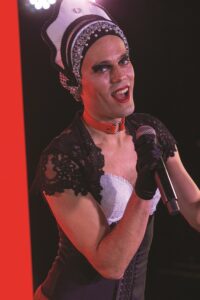
In recent years, Hutchinson has been seen walking the streets of Provincetown, where she leads popular local history tours, and on several of its stages as a regular presence in comedy shows. She will be starring in Conventicles, her first weekly solo show, at the Crown & Anchor every Thursday at 9 p.m. through September.
Hutchinson is the alter ego of Brent Thomas, who sees what his character does as more than just comedy. “It’s musings and observations from my life filtered through Anne,” says Thomas, who moved to Provincetown from Boston in 2020. “It’s different from my tours, where I have to deliver certain facts every time. I want to make this more like a late-night show, with more timely material, everything from world news to local gossip.”
Speaking truth to power is very much a part of Thomas’s intention as well. “The title of the show is a play on words,” he says, “but also refers to the name of the weekly meetings that Anne Hutchinson would have in her home where she talked trash about the ministers and said things about their authority that they didn’t like. I wanted to continue that tradition.” Hutchinson became the ideal historical figure to express Thomas’s viewpoints on contemporary politics and culture. “She was an anti-establishment person and progressive in her own way,” says Thomas. “The legacy of colonialism is all around us. Anne speaks against those energies that still exist in the world. And if she makes people laugh and see the ridiculousness in things, even better.”
Tickets are $25. See onlyatthecrown.com for information. —John D’Addario
Gaston Lacombe’s Art Conceals and Reveals
Best known in recent years for his colorfully intricate geometric abstractions and stylized land and seascapes, Gaston Lacombe is taking a different direction in his newest mixed-media paintings.
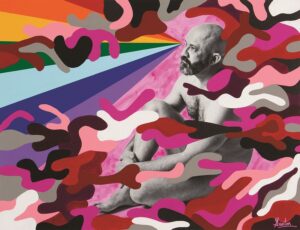
It is also his most personal body of work yet. Titled “Simplification of Nature,” the pieces incorporate nude self-portraits overpainted with sharply delineated camouflage designs. Lacombe says the inspiration for the project arose from his experience living in Provincetown and traveling beyond it once pandemic-related travel restrictions were finally lifted.
“I found myself often feeling that I had to censor who I am to keep myself safe and sane,” says Lacombe, who grew up in New Brunswick, Canada and moved to Provincetown in 2018. “I had to hide a bit of what I never need to censor in Provincetown. Depending on who I was with, or where I was, I needed to change what I said, the way I move, what I wear, and many other aspects of myself. It’s something I felt physically, since after so many years in Provincetown, I had forgotten what that felt like. I felt like I always needed to put part of myself under camouflage. Camouflage is in essence a simplification of nature, and that’s what I felt I was doing: simplifying who I am to fit in and protect myself.”
While all his work is labor-intensive (even his smallest pieces contain dozens of carefully hand-painted components in tight geometric compositions), the new pieces are especially so. “I take my own photos,” says Lacombe, who worked as a photojournalist for nearly a decade before opening his Provincetown gallery. “I print the photos on a thick cotton paper that can take both the ink from the printer and the medium I add on top. I create the work with India ink and acrylic paint. Then I mount the piece on a piece of wood to make it rigid.”
“Simplification of Nature” opens at Studio Lacombe (237 Commercial St., Provincetown) with a reception on Friday, June 30 at 5 p.m. and runs through July. See studiolacombe.com for information. —John D’Addario
30 Years of Photographs by Michael Stuetz at Hawthorne Barn
For the last 30 years, Michael Stuetz has been keeping a photographic diary of his time in Provincetown. A selection of images — printed from thousands of negatives and featuring portraits of “family, friends, lovers, and enemies,” as well as architectural studies — will be exhibited at the Hawthorne Barn (25 Miller Hill Road, Provincetown) on Saturday, July 1 from 6 to 10 p.m.

“My art usually includes people,” says Stuetz in a statement accompanying the show. “What has emerged is art that combines the past and present.”
Intensely personal, the project is also a collective portrait of Provincetown itself. While the town has changed since Stuetz began taking pictures here in 1993, there’s a timeless quality to his images: the same light casting its spell over the streets or filtered through a bedroom window, the same spirit of freedom and desire suffusing the atmosphere in which he and his models are depicted. As such, the photographs are both a nostalgic tribute to a Provincetown that no longer exists and a testament to its timeless quality.
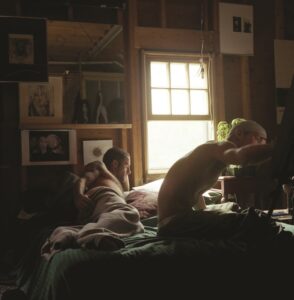
Stuetz, who currently divides his time between New York, New Jersey, and Provincetown, uses a vintage Rolleiflex medium format camera, which allows for intimacy with his subjects. “It’s great for shooting because it’s not as intrusive,” he says, as the camera is held against the torso instead of directly to the eye. “This is the greatest camera if you want to shoot in a crowd without anyone knowing.”
After the July 1 event, the exhibition will be viewable by appointment through the end of July. Email [email protected] for information. —John D’Addario
‘Summer Escape’ at Gaa Gallery
A current group show at Gaa Gallery (494 Commercial St., Provincetown) presents some of the abstract pleasures of the season.
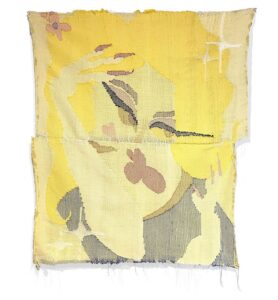
Curated by Gavin Kennedy, “Summer Escape” includes work by 13 artists that “explores the role that art can play in helping us reflect, cope, and heal in troubled times,” according to a gallery statement. While the work is diverse in media and style, the show is aesthetically cohesive, leaning towards bright colors and buoyant atmospherics. True to its title, escapism is a prominent motif linking several of the pieces. Some of them — like Juan Arango Palacios’s hand-stitched Shy Queen (which reads as a sort of high femme version of the Shroud of Turin) and Mark Joshua Epstein’s West Coast Dinner on East Coast Time #3 — offer an emphatically queer sense of humor as a means of escape and healing.
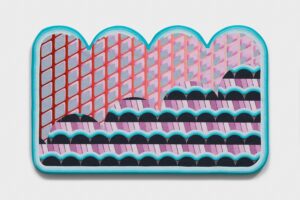
There’s also a marked spiritual element connecting several of the works. Amy Lincoln’s Rainbow Sky Study (Concentric Flower Shapes) transforms an abstracted seascape into a devotional mandala, while Laurens Legiers’s tightly cropped drawing of three sailboats in a harbor economically conveys Kennedy’s conception of Provincetown as a “magical refuge.” Krzysztof Strzelecki’s glazed ceramic vessel featuring naked male bodies disporting themselves in a bright riot of jungle foliage transposes that refuge to a more tropical setting: think Henri Rousseau meets Tom of Finland. And in the midst of it all, Pacifico Silano’s enigmatic dye-sublimation print Possession (II), an arresting image of a pair of clenched fists crossed over a swath of bare torso presented in the form of an oversized magazine centerfold, evinces a sense of strength and resilience amidst the frivolity.
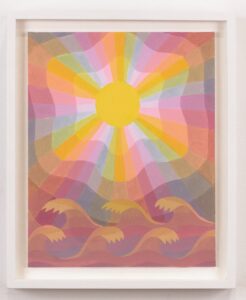
The show opens with an artist reception on Friday, June 30 at 6 p.m., and will be on view until Sept. 30. See gaa-gallery.com for information. —John D’Addario
A Story of Indigenous Upbringing
Deborah Taffa always knew that she was a writer. Growing up as a citizen of the Quechan (Yuma) and Laguna Pueblo Nation, Taffa says that storytelling was a way to resist dominant cultural narratives about Native Americans. “There seemed to be large cultural misunderstandings about who we were,” she says. “Sometimes it even affected my sense of who I was myself. Storytelling was the balm that could fix that.”
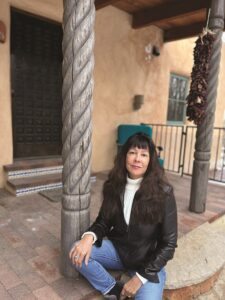
Taffa is the director of the M.F.A. program in creative writing at the Institute of American Indian Arts in Santa Fe, N.M. and author of a forthcoming memoir, Whiskey Tender, set to be released in February 2024. She is teaching a weeklong workshop at the Fine Arts Work Center (24 Pearl St., Provincetown) this month, and will also join a faculty presentation with painter Andrew Mockle and poet Kimiko Hahn on Monday, July 3, 2023, at 6 p.m.
Taffa says that FAWC reached out to her for assistance in getting more people from rural and Native communities to participate in its workshops. “They are thinking about ways to draw from what a lot of people call ‘flyover country,’ ” she says. “We have something to add to the conversation, and it’s exciting that we’re going to be having those conversations.”

Whiskey Tender tells the silenced history of her community, family, and childhood. Taffa says her aim was to write this history in a way that felt dynamic rather than academic or didactic. She says that the memoir works to “unearth silenced histories in a way that is very alive, rather than being dry or boring. It’s hung on the story of a family, one that has gone through a lot of kookiness and violence.” She wrote the memoir, she says, for younger Native American children as well as all Americans looking for a more expansive definition of American identity. “People deserve to know American history in a broader way than we’re teaching it in schools,” she says. “It’s the only way that we’re going to be able to heal as a country.”
The presentation is free and open to the public. See fawc.org for information. —Oliver Egger



